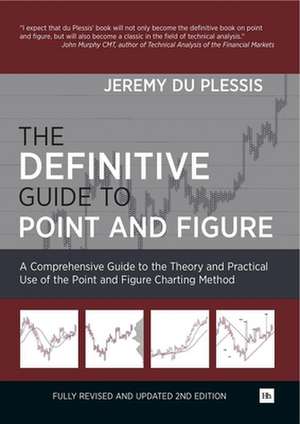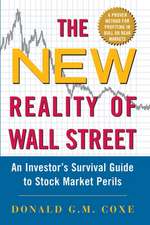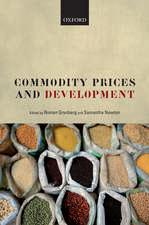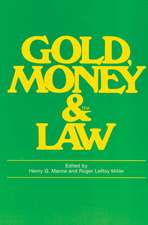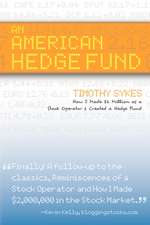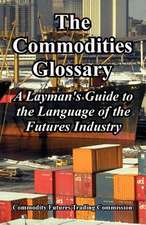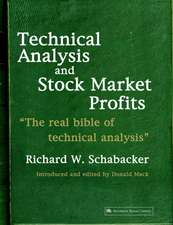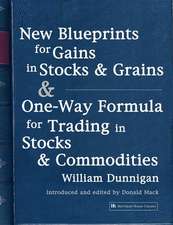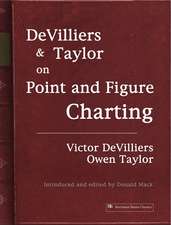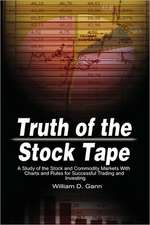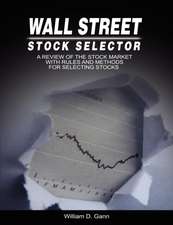The Definitive Guide to Point and Figure
Autor Jeremy Du Plessisen Limba Engleză Hardback – sep 2012
Point and Figure charts are one of the great secrets of the Technical Analysis world. Highly sophisticated and with a thoroughbred pedigree, they can, however, be overlooked by traders today. Jeremy du Plessis - one of the foremost Point and Figure experts in the world - returns with a fully updated second edition of this definitive guide in an effort to redress this imbalance.
This second edition, with an extensive revision to the text and introduction of brand new techniques, demystifies the world of Point and Figure charting. It includes a detailed explanation of the history and development of the technique from its invention to the modern day, and covers the makeup of the chart patterns, why they are created, and how to interpret them.
Throughout, readers are encouraged to understand Point and Figure charts from first principles, rather than just remember the names of a series of patterns. It is the first major work for 50 years to discuss in depth the original 1-box reversal method of Point and Figure charting and contrast it with the more popular 3-box reversal method. Further, the explanation of how to use Point and Figure charts to project targets and calculate risk-reward ratios is the most comprehensive ever seen.
Also featured in the second edition are:
- A step-by-step analysis of the FTSE 100 Index using the 3-box method, as well as the NASDAQ Composite Index, using the 1-box method
- A detailed discussion of optimising techniques
- An in-depth chapter on Analysing Point and Figure charts, extensively rewritten from the first edition
- A new explanation of how Point and Figure parameters are chosen and the implications of choosing them
- Two new Point and Figure construction methods never seen before
- Point and Figure's contribution to market breadth, with a look at bullish percent and two brand new indicators
- Full discussion of Point and Figure gaps and how they provide valuable information about the chart
- Lesser known, more advanced techniques such as the use of moving averages, parabolic SAR and Bollinger Bands on Point and Figure charts
- Price and volume activity histograms and how they provide information about support and resistance
All this is illustrated with numerous colour charts and observations from years of trading experience.
According to du Plessis, Point and Figure charts are the 'voice of the market'. This book helps you listen to, and understand, that voice.
Part of the Market Technicians Association (MTA) Required Reading list.
This second edition, with an extensive revision to the text and introduction of brand new techniques, demystifies the world of Point and Figure charting. It includes a detailed explanation of the history and development of the technique from its invention to the modern day, and covers the makeup of the chart patterns, why they are created, and how to interpret them.
Throughout, readers are encouraged to understand Point and Figure charts from first principles, rather than just remember the names of a series of patterns. It is the first major work for 50 years to discuss in depth the original 1-box reversal method of Point and Figure charting and contrast it with the more popular 3-box reversal method. Further, the explanation of how to use Point and Figure charts to project targets and calculate risk-reward ratios is the most comprehensive ever seen.
Also featured in the second edition are:
- A step-by-step analysis of the FTSE 100 Index using the 3-box method, as well as the NASDAQ Composite Index, using the 1-box method
- A detailed discussion of optimising techniques
- An in-depth chapter on Analysing Point and Figure charts, extensively rewritten from the first edition
- A new explanation of how Point and Figure parameters are chosen and the implications of choosing them
- Two new Point and Figure construction methods never seen before
- Point and Figure's contribution to market breadth, with a look at bullish percent and two brand new indicators
- Full discussion of Point and Figure gaps and how they provide valuable information about the chart
- Lesser known, more advanced techniques such as the use of moving averages, parabolic SAR and Bollinger Bands on Point and Figure charts
- Price and volume activity histograms and how they provide information about support and resistance
All this is illustrated with numerous colour charts and observations from years of trading experience.
According to du Plessis, Point and Figure charts are the 'voice of the market'. This book helps you listen to, and understand, that voice.
Part of the Market Technicians Association (MTA) Required Reading list.
Preț: 412.56 lei
Preț vechi: 473.68 lei
-13% Nou
Puncte Express: 619
Preț estimativ în valută:
78.95€ • 81.96$ • 65.83£
78.95€ • 81.96$ • 65.83£
Carte disponibilă
Livrare economică 01-15 martie
Livrare express 15-21 februarie pentru 80.91 lei
Preluare comenzi: 021 569.72.76
Specificații
ISBN-13: 9780857192455
ISBN-10: 0857192450
Pagini: 544
Dimensiuni: 170 x 244 x 30 mm
Greutate: 1.06 kg
Ediția:Revised
Editura: HARRIMAN HOUSE LTD
ISBN-10: 0857192450
Pagini: 544
Dimensiuni: 170 x 244 x 30 mm
Greutate: 1.06 kg
Ediția:Revised
Editura: HARRIMAN HOUSE LTD
Cuprins
About the Author
Preface to the Second Edition
Preface to the First Edition
Introduction
Introduction to Technical Analysis
1. Introduction to Point and Figure Charts
History and development
Where did Point and Figure charts get their name?
The use of Point and Figure charts over the years
The voice of the market
2. Characteristics and Construction
Characteristics of Point and Figure charts
Point and Figure construction
3-box reversal charts
5-box reversal charts
2-box and other reversal charts
Summary so far
The move from intra-day to end-of-day - The great controversy
End-of-interval time-frame Point and Figure charts
Log scale Point and Figure charts
Summary
3. Understanding Patterns and Signals
1-Box and 3-Box Reversal Charts
Point and Figure signals
The strength of the pattern
The breakout and pullback
Terminology clarification
1-box and 3-box patterns
Traps
Broadening patterns
Bullish and bearish patterns that reverse
Poles
Other Patterns
Congestion analysis
Signals with the trend or against the trend
Summary
4. Understanding and using Trend lines
Trend line breaks
45° Bullish support and bearish resistance lines
Trend lines and signal rules
Summary
5. Projecting Price Targets
Counts on 1-box reversal charts
Counts on 3-box reversal charts
Things you should know about Point and Figure counts
Counts on other box reversal charts
Counts on log scale charts
De Villiers and Taylor 3-box horizontal counts
Risk and reward
Another way of projecting targets ߝ Fibonacci retracements
Summary
6. Analysing Point and Figure Charts
Implications of changing the construction parameters
Choosing your chart parameters
Drawing your first Point and Figure chart
Showing gaps
Other ways of determining box size
Analysis of 3-box reversal charts
Analysis using 1-box reversal charts
Analysis of 2-box charts
Stoplosses on Point and Figure
Low-risk entries
Summary
7. Point and Figure Charts of Indicators
Point and Figure of relative strength
Point and Figure of on-balance volume
Point and Figure of oscillators
Summary
8. Optimisation of Point and Figure Charts
The case for and against optimisation
Approaching Point and Figure optimisation
Optimising for specific patterns
Conclusion
9. Point and Figure’s Contribution to Market Breadth
Introduction
A caveat
Bullish Percent
Bullish Trend Percent
X-Column Percent
Other Market Breadth Indicators based on Point and Figure
Market Breadth on other markets
Summary
10. Advanced Point and Figure Techniques
Moving averages on Point and Figure
Parabolic stop and reverse (SAR) on Point and Figure
Bollinger Bands on Point and Figure
Activity histograms
Summary
11. Chart Examples
Spot Euro Dollar (daily) 0.01 x 1
Spot Euro Dollar (60 minute) 0.01 x 1
Gold PM Fix 5 x 1
Gold PM Fix 5 x 3
Brent Crude Index (IPE) 2% x 1
Brent Crude Index (IPE) 1% x 3
MIB 30 Index 1% x 3
Nikkei 225 Index 100 x3
Hang Seng Index 100 x3
DJ Euro Stoxx 50 1% x3
Infineon Technologies AG 2% x 3
IBM 1% x 3
Compuware Corporation 1% x 1
Intel Corporation 0.25 x 3
American Express Company 1.5% x 3
Three month sterling interest rate future (June 2005) (60 minute) 0.025 x 1
Gold 15 x 3
US 10 year yield 0.025 x 3
Brent Crude
Summary
12. Dividing your Stocks into Bullish and Bearish
Conclusion
References and Further Reading
Appendix A - Construction of 2-Box Reversal Charts
Example of a 10 x 2 Point and Figure chart
Appendix B - Construction of 1-Box Reversal High/Low Charts
Example of a 10 x 1 Point and Figure chart using high/low prices
Appendix C - Construction of Log Scaled Charts
Index
Preface to the Second Edition
Preface to the First Edition
Introduction
Introduction to Technical Analysis
1. Introduction to Point and Figure Charts
History and development
Where did Point and Figure charts get their name?
The use of Point and Figure charts over the years
The voice of the market
2. Characteristics and Construction
Characteristics of Point and Figure charts
Point and Figure construction
3-box reversal charts
5-box reversal charts
2-box and other reversal charts
Summary so far
The move from intra-day to end-of-day - The great controversy
End-of-interval time-frame Point and Figure charts
Log scale Point and Figure charts
Summary
3. Understanding Patterns and Signals
1-Box and 3-Box Reversal Charts
Point and Figure signals
The strength of the pattern
The breakout and pullback
Terminology clarification
1-box and 3-box patterns
Traps
Broadening patterns
Bullish and bearish patterns that reverse
Poles
Other Patterns
Congestion analysis
Signals with the trend or against the trend
Summary
4. Understanding and using Trend lines
Trend line breaks
45° Bullish support and bearish resistance lines
Trend lines and signal rules
Summary
5. Projecting Price Targets
Counts on 1-box reversal charts
Counts on 3-box reversal charts
Things you should know about Point and Figure counts
Counts on other box reversal charts
Counts on log scale charts
De Villiers and Taylor 3-box horizontal counts
Risk and reward
Another way of projecting targets ߝ Fibonacci retracements
Summary
6. Analysing Point and Figure Charts
Implications of changing the construction parameters
Choosing your chart parameters
Drawing your first Point and Figure chart
Showing gaps
Other ways of determining box size
Analysis of 3-box reversal charts
Analysis using 1-box reversal charts
Analysis of 2-box charts
Stoplosses on Point and Figure
Low-risk entries
Summary
7. Point and Figure Charts of Indicators
Point and Figure of relative strength
Point and Figure of on-balance volume
Point and Figure of oscillators
Summary
8. Optimisation of Point and Figure Charts
The case for and against optimisation
Approaching Point and Figure optimisation
Optimising for specific patterns
Conclusion
9. Point and Figure’s Contribution to Market Breadth
Introduction
A caveat
Bullish Percent
Bullish Trend Percent
X-Column Percent
Other Market Breadth Indicators based on Point and Figure
Market Breadth on other markets
Summary
10. Advanced Point and Figure Techniques
Moving averages on Point and Figure
Parabolic stop and reverse (SAR) on Point and Figure
Bollinger Bands on Point and Figure
Activity histograms
Summary
11. Chart Examples
Spot Euro Dollar (daily) 0.01 x 1
Spot Euro Dollar (60 minute) 0.01 x 1
Gold PM Fix 5 x 1
Gold PM Fix 5 x 3
Brent Crude Index (IPE) 2% x 1
Brent Crude Index (IPE) 1% x 3
MIB 30 Index 1% x 3
Nikkei 225 Index 100 x3
Hang Seng Index 100 x3
DJ Euro Stoxx 50 1% x3
Infineon Technologies AG 2% x 3
IBM 1% x 3
Compuware Corporation 1% x 1
Intel Corporation 0.25 x 3
American Express Company 1.5% x 3
Three month sterling interest rate future (June 2005) (60 minute) 0.025 x 1
Gold 15 x 3
US 10 year yield 0.025 x 3
Brent Crude
Summary
12. Dividing your Stocks into Bullish and Bearish
Conclusion
References and Further Reading
Appendix A - Construction of 2-Box Reversal Charts
Example of a 10 x 2 Point and Figure chart
Appendix B - Construction of 1-Box Reversal High/Low Charts
Example of a 10 x 1 Point and Figure chart using high/low prices
Appendix C - Construction of Log Scaled Charts
Index
Notă biografică
Jeremy du Plessis, CMT, FSTA, trained as an automotive engineer, then an economist, but gave them both up to become a Technical Analyst. In 1983 he founded Indexia Research and pioneered the development of PC-based technical analysis software with the Indexia range of technical analysis systems. During the 1980s he developed a number of technical tools and indicators under the banner of Indexia, such as the Indexia Market Tracker and Indexia moving averages, which are still used in software to this day. He is an expert on Point and Figure charts, and the Indexia software was the first PC-based system to draw them correctly and clearly in the early 1980s. He lectures the Point and Figure module for the Society of Technical Analysts and sets the Point and Figure syllabus for the International Federation of Technical Analysts. He has taught Technical Analysis, and in particular Point and Figure, to thousands of professional traders and investors over the last 20 years. In 2001, after running Indexia Research for nearly 20 years, he agreed to merge the company with Updata plc, where he is now head of Technical Analysis and Product Development, and the designer of the Updata PC and SmartPhone technical analysis software. He is a Fellow of the Society of Technical Analysts (FSTA) in the UK, and a member of the American Market Technicians Association (MTA) as well as the American Association of Professional Technical Analysts (AAPTA). He is a holder of the Chartered Market Technician (CMT) designation awarded by the MTA.
Descriere
Point and Figure charts are one of the great secrets of the Technical Analysis world. Highly sophisticated and with a thoroughbred pedigree, they can, however, be overlooked by traders today. Jeremy du Plessis - one of the foremost Point and Figure experts in the world - returns with a fully updated second edition of this definitive guide in an effort to redress this imbalance.
This second edition, with an extensive revision to the text and introduction of brand new techniques, demystifies the world of Point and Figure charting. It includes a detailed explanation of the history and development of the technique from its invention to the modern day, and covers the makeup of the chart patterns, why they are created, and how to interpret them.
Throughout, readers are encouraged to understand Point and Figure charts from first principles, rather than just remember the names of a series of patterns. It is the first major work for 50 years to discuss in depth the original 1-box reversal method of Point and Figure charting and contrast it with the more popular 3-box reversal method. Further, the explanation of how to use Point and Figure charts to project targets and calculate risk-reward ratios is the most comprehensive ever seen.
Also featured in the second edition are:
- A step-by-step analysis of the FTSE 100 Index using the 3-box method, as well as the NASDAQ Composite Index, using the 1-box method
- A detailed discussion of optimising techniques
- An in-depth chapter on Analysing Point and Figure charts, extensively rewritten from the first edition
- A new explanation of how Point and Figure parameters are chosen and the implications of choosing them
- Two new Point and Figure construction methods never seen before
- Point and Figure's contribution to market breadth, with a look at bullish percent and two brand new indicators
- Full discussion of Point and Figure gaps and how they provide valuable information about the chart
- Lesser known, more advanced techniques such as the use of moving averages, parabolic SAR and Bollinger Bands on Point and Figure charts
- Price and volume activity histograms and how they provide information about support and resistance
All this is illustrated with numerous colour charts and observations from years of trading experience.
According to du Plessis, Point and Figure charts are the 'voice of the market'. This book helps you listen to, and understand, that voice.
Part of the Market Technicians Association (MTA) Required Reading list.
This second edition, with an extensive revision to the text and introduction of brand new techniques, demystifies the world of Point and Figure charting. It includes a detailed explanation of the history and development of the technique from its invention to the modern day, and covers the makeup of the chart patterns, why they are created, and how to interpret them.
Throughout, readers are encouraged to understand Point and Figure charts from first principles, rather than just remember the names of a series of patterns. It is the first major work for 50 years to discuss in depth the original 1-box reversal method of Point and Figure charting and contrast it with the more popular 3-box reversal method. Further, the explanation of how to use Point and Figure charts to project targets and calculate risk-reward ratios is the most comprehensive ever seen.
Also featured in the second edition are:
- A step-by-step analysis of the FTSE 100 Index using the 3-box method, as well as the NASDAQ Composite Index, using the 1-box method
- A detailed discussion of optimising techniques
- An in-depth chapter on Analysing Point and Figure charts, extensively rewritten from the first edition
- A new explanation of how Point and Figure parameters are chosen and the implications of choosing them
- Two new Point and Figure construction methods never seen before
- Point and Figure's contribution to market breadth, with a look at bullish percent and two brand new indicators
- Full discussion of Point and Figure gaps and how they provide valuable information about the chart
- Lesser known, more advanced techniques such as the use of moving averages, parabolic SAR and Bollinger Bands on Point and Figure charts
- Price and volume activity histograms and how they provide information about support and resistance
All this is illustrated with numerous colour charts and observations from years of trading experience.
According to du Plessis, Point and Figure charts are the 'voice of the market'. This book helps you listen to, and understand, that voice.
Part of the Market Technicians Association (MTA) Required Reading list.
